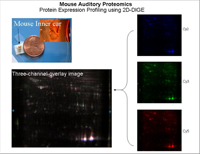Auditory Proteomics
 Mouse models have been used extensively to understand the genetic basis of hearing loss in humans. However, a review of the literature shows that few auditory proteomic studies have been undertaken with mouse models. Identifying the genes associated with hearing loss is an important first step. However, since proteins are intimately connected with the physiology (or at the 'business end') of the organ, identifying the protein associated with hearing loss will be critical in finding a cure for hearing impairment in humans. Proteomics is now considered to be a priority and many in the hearing research field are going to look for that "complementary and critical" information at the protein level in their favorite mouse model. For many of these investigators, the availability of a proteome atlas of the mouse cochlea at various postnatal ages' in common inbred strains would be extremely valuable (save time and resources). There is a great need to generate a comprehensive proteome atlas of the cochlea and the laboratory mouse is an excellent model for mammalian cochlea. The generation of a proteome atlas would simplify the task of analyzing changes in protein expression and modifications as a function of development and disease, which is of great importance to researchers in the auditory field.
Mouse models have been used extensively to understand the genetic basis of hearing loss in humans. However, a review of the literature shows that few auditory proteomic studies have been undertaken with mouse models. Identifying the genes associated with hearing loss is an important first step. However, since proteins are intimately connected with the physiology (or at the 'business end') of the organ, identifying the protein associated with hearing loss will be critical in finding a cure for hearing impairment in humans. Proteomics is now considered to be a priority and many in the hearing research field are going to look for that "complementary and critical" information at the protein level in their favorite mouse model. For many of these investigators, the availability of a proteome atlas of the mouse cochlea at various postnatal ages' in common inbred strains would be extremely valuable (save time and resources). There is a great need to generate a comprehensive proteome atlas of the cochlea and the laboratory mouse is an excellent model for mammalian cochlea. The generation of a proteome atlas would simplify the task of analyzing changes in protein expression and modifications as a function of development and disease, which is of great importance to researchers in the auditory field.
We propose to generate a Proteome Atlas of the Cochlea for C57BL/6J (6J). B6 is an important inbred strain in hearing research and the entire genome sequence is available for this strain as well. Cochlea from various embryonic and postnatal stages would be used to lay the foundation for Mouse Auditory Proteome database. We call this project MAP. We plan to generate proteome atlas for other inbred strain CBA/CaJ as well, because this strain is considered to be a good hearing strain of mice and it is used extensively by investigators in the field.
This work will be carried out in collaboration with Mark Chance and his colleagues at the newly created Center for Proteomics housed in the School of Medicine.
Personnel Involved
PI: Kumar Alagramam, PhD
Research Associate: Daniel Chen, MS
Research Associate: Lauren Kisley, BS
Collaborators
Mark Chance, PhD (Case Proteomics Center)
Shuqing Liu, MS (Case Proteomics Center)


